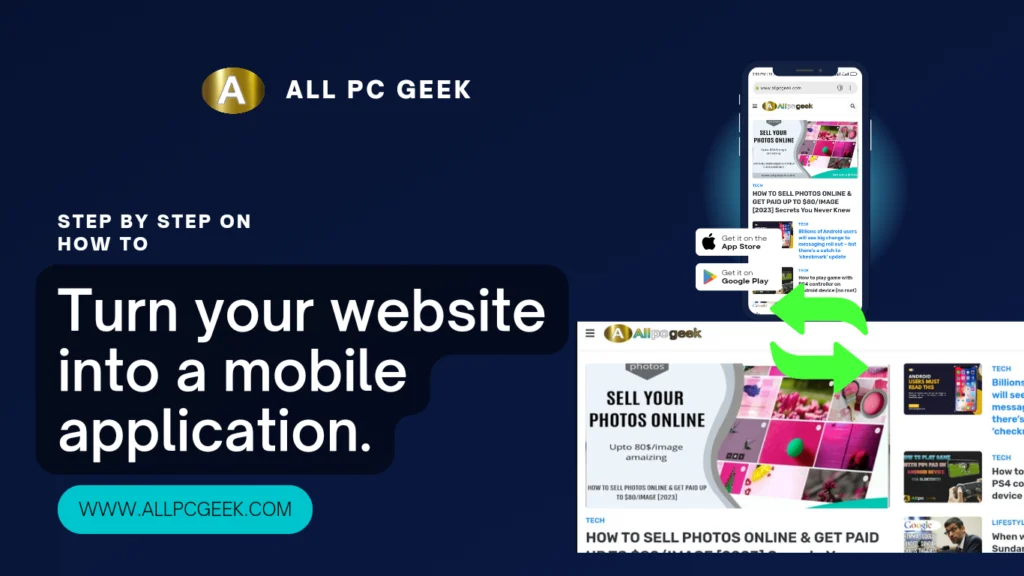Having a mobile application for your website can have a significant impact on user experience and engagement in today’s digital age. Since most users access the internet through mobile devices, converting your website into a mobile app can improve accessibility, performance, and a seamless user interface.
This guide explores the simplest methods for converting your website into a mobile application, highlighting different methods, tools, and frameworks that simplify the process.
Here you can watch this video on how to convert site to android app using chatGPT
Why Convert a Website into a Mobile App?
Before diving into the methods, let’s discuss why turning your website into a mobile app is a smart move:
- Improved User Experience: Apps offer a smoother, faster, and more engaging experience compared to websites.
- Offline Access: Unlike websites, apps can function offline with cached data.
- Push Notifications: Apps enable real-time notifications to keep users engaged.
- Brand Visibility: Having an app increases brand credibility and user retention.
- Better Performance: Apps operate faster than mobile websites, enhancing usability.
Methods to Convert Your Website into a Mobile App
There are several ways to transform your website into a mobile application, each with its own set of benefits and challenges.
1. Using Online App Builders
Online app builders are the easiest and most cost-effective way to create an app from a website. These platforms allow you to convert your website into an app with minimal coding knowledge.
Popular Online App Builders:
- AppMySite – Allows you to convert your website into a native app effortlessly.
- Thunkable – Provides a drag-and-drop interface for easy app creation.
- AppPresser – Best for WordPress-based websites.
- Convertify – Quickly turns websites into Android and iOS apps.
2. Progressive Web Apps (PWA)
A Progressive Web App (PWA) is an advanced version of a website that mimics the behavior of a mobile app. PWAs are lightweight, cost-effective, and do not require App Store approval.
Benefits of PWAs:
- Faster Load Time – Uses service workers to cache content and load instantly.
- No Installation Required – Users can access PWAs directly from their browser.
- Cost-Effective – No need for separate app development.
- Cross-Platform Compatibility – Works on both Android and iOS seamlessly.
3. Using WebView in Native Apps
WebView is a component that allows developers to load a website within a native app. This method is simple and allows you to retain your website’s existing functionality.
How to Implement WebView:
- Use Android WebView for Android apps.
- Use WKWebView for iOS apps.
- Embed your website’s URL into a simple app shell.
- Add navigation controls and permissions for an improved user experience.
4. Using Flutter or React Native
If you want more control and customization, using Flutter or React Native is an excellent choice. These frameworks allow you to create high-performance mobile apps that integrate seamlessly with your website.
Comparison Table:
| Feature | Flutter | React Native |
|---|---|---|
| Language | Dart | JavaScript |
| Performance | High (Native-like) | Moderate |
| UI Flexibility | Excellent | Good |
| Community Support | Growing Fast | Large Community |
| Learning Curve | Moderate | Easy for JS users |
5. Hiring a Mobile App Developer
For businesses that require a fully customized mobile app, hiring a professional developer or an app development company is the best option.
Pros of Hiring a Developer:
- Fully customizable.
- Advanced features and integrations.
- Professional touch and better performance.
Cons:
- Expensive compared to DIY methods.
- Longer development time.
Pros and Cons of Converting a Website into a Mobile App
| Pros | Cons |
| Enhanced User Experience | Development Costs |
| Increased Engagement | Requires Maintenance |
| Better Performance | App Store Approval Needed |
| Push Notification Support | Platform Compatibility Issues |
| Offline Access | Regular Updates Required |
Key Takeaways
- Converting a website into a mobile app improves user experience, engagement, and performance.
- Online app builders are the easiest and fastest solution for non-developers.
- PWAs are cost-effective and do not require installation.
- WebView-based apps allow quick transformation of a website into an app.
- Flutter and React Native provide high-performance native-like apps.
- Hiring a developer ensures full customization but at a higher cost.
FAQs
1. Can I convert my website into an app for free?
Yes, some online platforms like Thunkable and AppMySite offer free trials, but advanced features often require paid plans.
2. Will my app work on both Android and iOS?
Yes, if you choose cross-platform development frameworks like Flutter, React Native, or PWAs, your app will work on both platforms.
3. Do I need coding skills to convert my website into an app?
Not necessarily. Online app builders and WebView-based apps require little to no coding knowledge.
4. How long does it take to convert a website into an app?
Using online tools, it can take a few hours to a couple of days. Custom app development can take weeks or months.
5. Do I need an App Store account to publish my app?
Yes, for Android, you need a Google Play Developer account ($25 one-time fee). For iOS, you need an Apple Developer account ($99/year).
Conclusion
To improve user engagement and accessibility, it’s a smart move to convert your website into a mobile application. Based on your budget, technical skills, and project requirements, you can choose from online app builders, PWAs, WebView solutions, or native app development frameworks. The best method depends on your specific needs, as each method has its advantages.
Online app builders and WebView-based apps are great options if you’re seeking a quick and easy solution. Flutter or React Native may be the most suitable solution for a high-performance and feature-packed app.
Expanding your online presence and providing a better experience to your users can be achieved by making the right choice.

